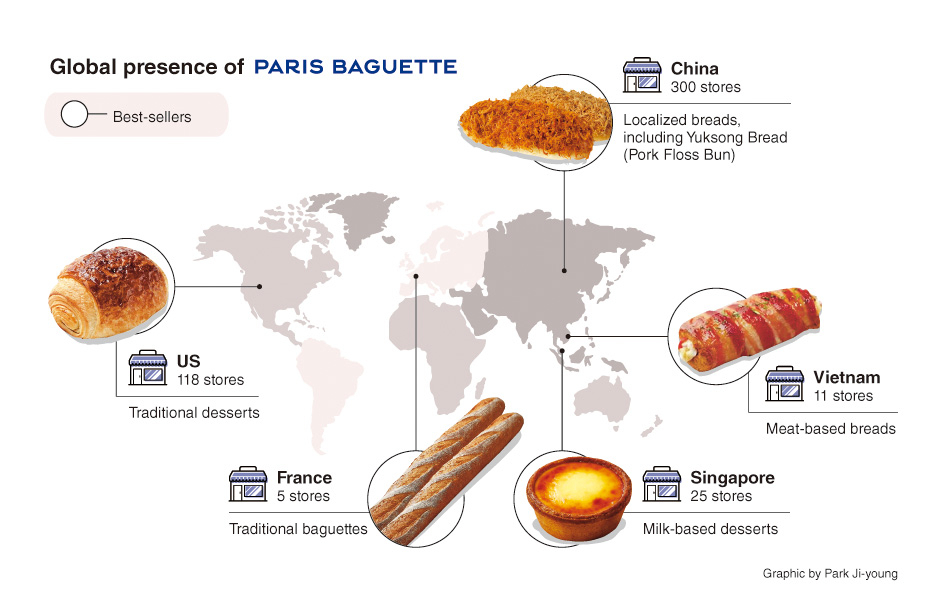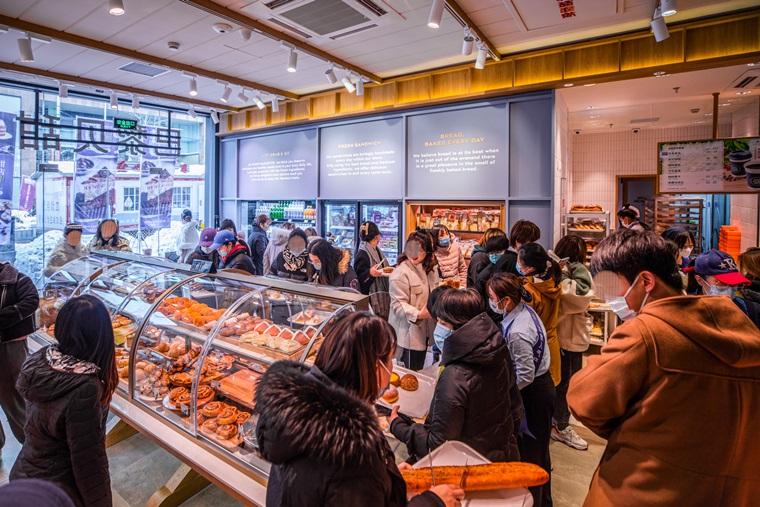 |
Jack Francis Moran, director of global strategy at SPC (SPC) |
This is the first installment of a series of interviews with global business chiefs of South Korean food companies that are expanding aggressively in overseas markets. -- Ed.
Paris Baguette is a bakery as common in South Korea as Dunkin Donuts is in the United States. The nation’s No. 1 bakery chain, operated by food giant SPC Group, boasts a whopping 3,400 outlets nationwide, which means almost one in five bakeries in Korea is a Paris Baguette store.
In recent years, Paris Baguette has sought to recreate its huge success at home in overseas markets with its idiosyncratic buffet-style bakery chain that offers an average of more than 300 products per store.
The “globalization” strategy has proved successful so far. Over the past five years, its overseas sales have more than doubled, with some 450 stores opening in nine countries around the world.
"In order to compete head-on with the local brands in foreign nations, we think it is necessary to launch products that have global competitiveness (globalization) while adequately supplementing each country's menu with extra products suited to capture local consumers' tastes (localization)," Jack Francis Moran, SPC’s global strategy chief, told The Korea Herald in a recent interview.
For example, in China, where two-thirds of its overseas outlets are located, SPC said it reaped commercial success in the market with strategy to organize 20 percent of the Chinese menu to include local products.
"China is a very large market with 1.4 billion people. It is one of the only markets where each region has its own subdivided market along with diverse ethnicity and consumption habits," said Moran.
"SPC conducted a Chinese market survey for more than 10 years and has invented products that comprehensively reflect all of the Chinese tastes.”
According to Moran, one of the best-sellers in China include "yuksong bread." Roughly translated into "meat floss bread," the product is a bun topped with China's all-time favorite meat floss, a cotton candy-like dried meat product.
Another popular product in China is the "ring donut," which resonated with Chinese customers across the nation. The donut resembles the number eight, which is known as the favorite number among Chinese people because it has the same pronunciation as the Chinese word for money.

Paris Baguette's strategy to target key commercial districts within a country to raise brand awareness, acquire as much foot traffic as possible and secure strategic bases for expansion have likewise proved to be effective.
"Such methods were used in Korea (to boost market share), and it also proved effective in China and US," Moran added.
In addition, Paris Baguette also said its distinctive interior helped the brand to appeal to foreign customers.
"One of the secrets to our popularity involves 'self-selecting breads using trays and tongs.’ It is a popular method for bakery franchises in Korea, but an unfamiliar interior design for bakeries abroad," Moran said.
"Customers are largely required to take out (wrapped) products from showcases (in bakeries abroad). We applied Paris Baguette's unfamiliar yet convenient method to all the stores across the world and were able to attract a lot of consumers," he added.
 |
Customers shop for baked goods at Paris Baguette's Shenyang branch in Liaoning, China. (SPC Group) |
SPC's main future goals center around foraying into the Middle East, as well as continuing to expand its business in Southeast Asia, the US and Europe.
"SPC Group plans to newly target the Middle East market, using Malaysia -- where we have recently started building a bread factory -- as a regional base for entry into the halal market. We positively view the Muslim market, as the area is responsible for 24 percent of the world population," said Moran.
For its existing businesses, Moran said SPC will be expanding its presence in the Southeast Asian market, with Singapore acting as the hub country.
It also aims high in the US and Europe which have a long-established bakery culture and industry. The brand plans to increase the number of stores in the US to 1,000 from the current 120 by 2030, while the number in Europe will be extended to 120 during the same period.
As of the first half of 2020, locally-operated franchise stores made up 84 percent in the US and 83 percent in China, respectively.
Moran said the expansion of franchise stores means that the brand has secured a firm footing in the markets while generating solid profits for the local operators.
"SPC Group will continue to make active investments to strengthen its global business by entering new countries and acquiring new brands," said Moran.







![[Herald Interview] How Gopizza got big in India](http://res.heraldm.com/phpwas/restmb_idxmake.php?idx=644&simg=/content/image/2024/11/20/20241120050057_0.jpg)